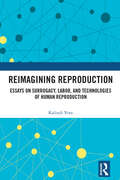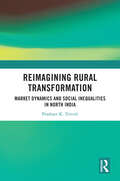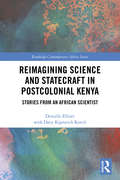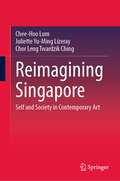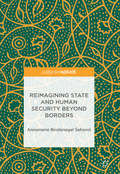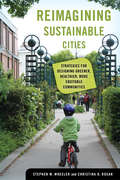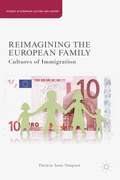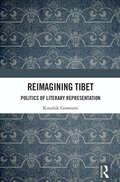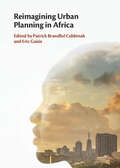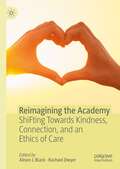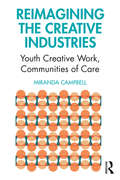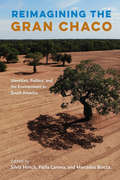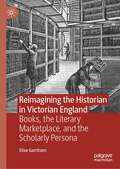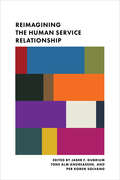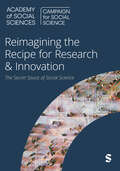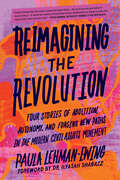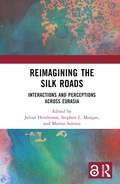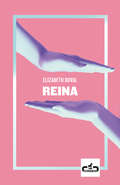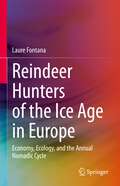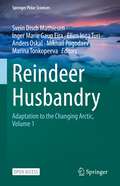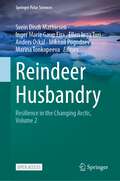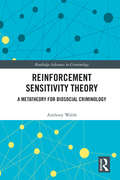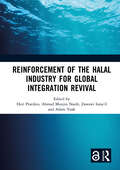- Table View
- List View
Reimagining Reproduction: Essays on Surrogacy, Labor, and Technologies of Human Reproduction
by Kalindi VoraThis book presents an ethnographic study on gestational surrogacy in India. It frames the ethnography of the surrogacy clinic in conversation with concerns raised in the arenas of law, policy, medical ethics, and global structural inequality about the ethics of transnational assisted reproductive technology (ART) practices. Engaging ethical discourses that both advocate for and trouble the subject of reproductive rights that remains of interest in feminist studies, the volume takes up the work of critical feminist, anthropological and science studies scholarship in India, the United States, and Europe concerned with reproductive technologies. Based on fieldwork and archival sources, the volume will be of great interest to scholars and researchers of ethnography, gender, social and public policy, South Asian studies, and global public health, especially reproductive health.
Reimagining Rural Transformation: Market Dynamics and Social Inequalities in North India
by Prashant K TrivediThis book examines the effects of the pattern of growing integration between the rural and urban economies in India. Drawing on in-depth surveys conducted in villages in north India, it examines the rural agricultural economy's transformation, productivity, technology deployment, and social relations over a period of seven years. The book focuses on the socially embedded nature of the dynamics of transformation, weaving analysis around the axis of land, caste, and gender. It also identifies policy gaps and recommends steps for a sustainable and inclusive rural transformation in the Global South.An important contribution to the study of India’s economic and social landscape, this book will be useful for scholars of agriculture, sociology, economics, political science, development studies, and South Asian studies. It will also be of interest to policymakers and journalists interested in rural development, migration, employment, agriculture, and demography.
Reimagining Science and Statecraft in Postcolonial Kenya: Stories from an African Scientist (Routledge Contemporary Africa)
by Denielle ElliottThis book examines the development of medical sciences in postcolonial Kenya, through the adventures and stories of the controversial Kalenjin scientist Davy Kiprotich Koech. As a collaborative life story project, it privileges African voices and retellings, re-centring the voice of African scientists from the peripheries of storytelling about science, global health research collaborations, national politics, international geopolitical alliances, and medical research. Focusing largely on the development of the Kenya Medical Research Institute (KEMRI) and its collaborations with the US Centers for Disease Control, the Walter Reed Project, Japan’s International Cooperation Agency, the Wellcome Trust, and other international partners, Denielle Elliott and Davy Koech challenge euro-dominant representations of African science and global health in both the contemporary and historical and offer an unconventional account which aims to destabilize colonial and neo-colonial narratives about African science, scientists, and statecraft. The stories force readers to contend with a series of questions including: How do imperial effects shape contemporary medical research and national sovereignty? In which ways do the colonial ghosts of early medical research infuse the struggles of postcolonial scientists to build national scientific projects? How were postcolonial nation-building projects tied up with the dreams and visions of African scientists? And lastly, how might we reimagine African medicine and biosciences? The monograph will be of interest to students, educators, and scholars working in African Studies, Science and Technology Studies, Postcolonial Studies, Global Health, Cultural Anthropology, and Medical Anthropology.
Reimagining Singapore: Self and Society in Contemporary Art
by Chee-Hoo Lum Juliette Yu-Ming Lizeray Chor Leng Twardzik ChingThis book approaches the subject of contemporary art by exploring the social embeddedness and identities of Singaporean artists. Linking artistic processes and production to both personal worlds and wider issues, the book examines how artists negotiate their relationships between self and society and between artistic freedom and social responsibility. It is based on original research into the discourses and artistic practices of local artists, with a special focus on emerging artists and artists whose work and perspectives engage with questions of identity. Reimagining contemporary Singapore and their place within it, artists are asserting their multiple and heterogeneous self-identities and contesting hegemonic norms and notions, as they negotiate and adapt to the world around them. This book is relevant to students and researchers in the fields of cultural studies, media studies, art, sociology of art, arts education, and race and ethnicity studies.
Reimagining State and Human Security Beyond Borders
by Annamarie Bindenagel ŠehovićThis book delves into the diffuse relationship between states, citizens, and non-citizens. It explores the theoretical heritage of human security and identifies practical responses to the (re)negotiated relationships between states and citizens, responsibility and accountability. It argues that the changes to global order since the 1990s have resulted in a divergence from the understanding of the State as the arbiter within its territory, and as the guarantor of (human) security within its borders. In addition, while interventionist actions of various non-state actors to implement material guarantees of (human) security reaching both citizens and non-citizens (including refugees) have solved some immediate problems, they have not answered the question of where accountability ultimately lies.
Reimagining Sustainable Cities: Strategies for Designing Greener, Healthier, More Equitable Communities
by Stephen M. WheelerA cutting-edge, solutions-oriented analysis of how we can reimagine cities around the world to build sustainable futures. What would it take to make urban places greener, more affordable, more equitable, and healthier for everyone? In recent years, cities have stepped up efforts to address climate and sustainability crises. But progress has not been fast enough or gone deep enough. If communities are to thrive in the future, we need to quickly imagine and implement an entirely new approach to urban development: one that is centered on equity and rethinks social, political, and economic systems as well as urban designs. With attention to this need for structural change, Reimagining Sustainable Cities advocates for a community-informed model of racially, economically, and socially just cities and regions. The book aims to rethink urban sustainability for a new era. In Reimagining Sustainable Cities, Stephen M. Wheeler and Christina D. Rosan ask big-picture questions of interest to readers worldwide: How do we get to carbon neutrality? How do we adapt to a climate-changed world? How can we create affordable, inclusive, and equitable cities? While many books dwell on the analysis of problems, Reimagining Sustainable Cities prioritizes solutions-oriented thinking—surveying historical trends, providing examples of constructive action worldwide, and outlining alternative problem-solving strategies. Wheeler and Rosan use a social ecology lens and draw perspectives from multiple disciplines. Positive, readable, and constructive in tone, Reimagining Sustainable Cities identifies actions ranging from urban design to institutional restructuring that can bring about fundamental change and prepare us for the challenges ahead.
Reimagining The European Family
by Patricia Anne SimpsonRe-imagining the Family explores contemporary films and literature about the effects of legal and illegal immigration on the structure and the stories of the contemporary 'European' family, with a focus on Germany.
Reimagining Tibet: Politics of Literary Representation
by Koushik GoswamiThis book examines how territorial, civilisational and cultural location determines one’s gaze and attitude while representing a contested space like Tibet. It analyses representations of Tibet in three novels: James Hilton’s Lost Horizon (1933), Jamyang Norbu’s The Mandala of Sherlock Holmes (1999) and Kaushik Barua’s Windhorse (2013). It shows how these novels project different types of gaze — insider, outsider and insider-outsider — and explores them within the context of some contemporary Tibetan activist writers. The book also looks at Tibetan exilic writings and virtual activities of the Tibetan activists whose programmes and rhetoric counter the age-old image of the Tibetans as passive and non-violent people. It shows how activists utilise social networking as an effective platform to counter imperialist occupation of Tibet by China. It includes interviews of eight Anglophone Tibetan writers – Tenzin Tsundue, Thubten Samphel, Tsering Namgyal Khortsa, Tsering Wangmo Dhompa, Jamyang Norbu, Tenzin Dickie, Bhuchung D. Sonam, and an Indian writer who has written on Tibet, Kaushik Barua. Interdisciplinary, accessible and engaging, this book presents one of the first studies on how Tibet has been represented in English fiction. It will be of interest to scholars and researchers of literature, media and cultural studies, politics, history and China studies.
Reimagining the Academy: ShiFting Towards Kindness, Connection, and an Ethics of Care
by Rachael Dwyer Alison L BlackThis book explores the capacities and desires of academic women to reimagine and transform academic cultures. Embracing and championing feminist scholarship, the research presented by the authors in this collection holds space for a different way of being in academia and shifts the conversation toward a future that is hopeful, kind and inclusive. Through exploring lived experiences, building caring communities and enacting an ethics of care, the authors are reimagining the academy’s focus and purpose. The autoethnographic and arts-based research approaches employed throughout the book provide evocative conceptual content, which responds to the symbolic nature of transformation in the academy. This innovative volume will be of interest and value to feminist scholars, as well as those interested in disrupting and rejecting patriarchal academic structures.
Reimagining the Creative Industries: Youth Creative Work, Communities of Care
by Miranda CampbellThis book documents the rise in youth creativity, entrepreneurship, and collective strategies to address systemic barriers and discrimination in the creative industries and create an expanded, more diverse, inclusive, equitable, and caring field. Although the difficulties of entering and making a living in the creative industries—a field which can often perpetuate dominant patterns of social exclusion and economic inequality—are well documented, there is still an absence of guidance on how young creatives can navigate this environment. Foregrounding an intersectional approach, Reimagining the Creative Industries responds to this gap by documenting the work of contemporary youth collectives and organizations that are responding to these systemic barriers and related challenges by creating more caring and community-oriented alternatives. Mobilizing a care ethics framework, Miranda Campbell underscores forms of care that highlight relationality, recognize structural barriers, and propose new visions for the creative industries. This book posits a future where creativity, collaboration, and community are possible through increased avenues for co-creation, teaching and learning, and community engagement. Anyone interested in thinking critically about the creative industries, youth culture, community work, and creative employment will be drawn to Campbell's incisive work.
Reimagining the Gran Chaco: Identities, Politics, and the Environment in South America
by Silvia Hirsch, Paola Canova, and Mercedes BioccaThis volume traces the socioeconomic and environmental changes taking place in the Gran Chaco, a vast and richly biodiverse ecoregion at the intersection of Argentina, Bolivia, Brazil, and Paraguay. Representing a wide range of contemporary anthropological scholarship that has not been available in English until now, Reimagining the Gran Chaco illuminates how the region’s many Indigenous groups are negotiating these transformations in their own terms. The essays in this volume explore how the region has become a complex arena of political, cultural, and economic contestation between actors that include the state, environmental groups and NGOs, and private businesses and how local actors are reconfiguring their subjectivities and political agency in response. With its multinational perspective, and its examination of major themes including missionization, millenarian movements, the Chaco war, industrial enclaves, extractivism, political mobilization, and the struggle for rights, this volume brings greater visibility to an underrepresented, complex region.
Reimagining the Historian in Victorian England: Books, the Literary Marketplace, and the Scholarly Persona
by Elise GarritzenThis book traces the transformation of history from a Romantic literary pursuit into a modern academic discipline during the second half of the nineteenth century, and shows how this change inspired Victorians to reconsider what it meant to be a historian. This reconceptualization of the ‘historian’ lies at the heart of this book as it explores how historians strove to forge themselves a collective scholarly persona that reflected and legitimised their new disciplinary status and gave them authority to speak on behalf of the past. The author argues that historians used the persona as a replacement for missing institutional structures, and converted book parts to a sphere where they could mould and perform their persona. By ascribing agency to titles, footnotes, running heads, typography, cover design, size, and other paratexts, the book makes an important shift in the way we perceive the formation of modern disciplines. By combining the persona and paratexts, it offers a novel approach to themes that have enjoyed great interest in the history of science. It examines, for example, the role which epistemic and moral virtues held in the Victorian society and scholarly culture, the social organization and hierarchies of scholarly communities, the management of scholarly reputations, the commercialization of knowledge, and the relationship between the persona and the underpinning social, political, economic, and cultural structures and hierarchies. Making a significant contribution to persona studies, it provides new insights for scholars interested in the history of humanities, science, and knowledge; book history; and Victorian culture.
Reimagining the Human Service Relationship
by Jaber Gubrium Tone Andreassen Per SolvangThe traditional lines of demarcation between service providers and service users are shifting. Professionals in managed service organizations are working to incorporate the voices of service users into their missions and the way they function, and service users, with growing access to knowledge, have taken on the semblances of professional expertise. Additionally, the human services environment has been transformed by administrative imperatives. The drive toward greater efficiency and accountability has weakened the bond between users and providers.Reimagining the Human Service Relationship is informed by the premise that the helping relationship should be seen as developing in the interactive space between those who provide human services and those who receive them. The contributors to this volume redefine the contours, roles, institutional divisions, means, and aims of providing and receiving services in a range of settings, including child welfare, addiction treatment, social enterprise, doctoring, mental health, and palliative care. Though they advocate an experience-near approach, they remain sensitive to the ambiguities and competing rationalities of the service relationship. Taken together, these chapters reimagine the service relationship by making visible the working relevancies of service delivery.
Reimagining the Recipe for Research & Innovation: the Secret Sauce of Social Science
by Campaign for Social ScienceThere is a critical yet under-explored role for the social sciences within the UK’s research, development and innovation system. This report argues that the social sciences can elevate this country’s research output to a world-leading level. There is, however, a danger of the social sciences being seen as an add-on or afterthought to STEM research whereby social scientists’ contributions are limited to identifying or ameliorating potentially negative ethical, legal or societal implications of scientific or technological advances. Our argument in this report is that social scientists have an essential role to play across the entire recipe - catalysing the development of new flavours - rather than simply being a garnish to a dish created by STEM. Ideas from social science need to be incorporated into STEM research right from the beginning, thereby enriching our perspectives and understanding of global challenges. Case studies include how social science can help us to develop effective climate change policies, combat AIDS rates amongst young people in South Africa, and assess the impact of AI technology on human rights. The report provides a systematic overview of the ways in which social science can benefit STEM research: 1. Social sciences enable whole systems thinking. 2. Social sciences are critical for good policy development. 3. Social sciences underpin smart & responsible innovation. 4. Social sciences are essential to international collaboration and tackling shared global challenges.
Reimagining the Recipe for Research & Innovation: the Secret Sauce of Social Science
by Campaign for Social ScienceThere is a critical yet under-explored role for the social sciences within the UK’s research, development and innovation system. This report argues that the social sciences can elevate this country’s research output to a world-leading level. There is, however, a danger of the social sciences being seen as an add-on or afterthought to STEM research whereby social scientists’ contributions are limited to identifying or ameliorating potentially negative ethical, legal or societal implications of scientific or technological advances. Our argument in this report is that social scientists have an essential role to play across the entire recipe - catalysing the development of new flavours - rather than simply being a garnish to a dish created by STEM. Ideas from social science need to be incorporated into STEM research right from the beginning, thereby enriching our perspectives and understanding of global challenges. Case studies include how social science can help us to develop effective climate change policies, combat AIDS rates amongst young people in South Africa, and assess the impact of AI technology on human rights. The report provides a systematic overview of the ways in which social science can benefit STEM research: 1. Social sciences enable whole systems thinking. 2. Social sciences are critical for good policy development. 3. Social sciences underpin smart & responsible innovation. 4. Social sciences are essential to international collaboration and tackling shared global challenges.
Reimagining the Revolution: Four Stories of Abolition, Autonomy, and Forging New Paths in the Modern Civil Rights Movement
by Paula Lehman-EwingThese are the architects of the modern civil rights movement: 4 profiles of revolutionary groups making change beyond protestA radically different approach to sustaining social justice movements—4 strategies for abolition and liberation from the new architects of the modern civil rights movementMany of us think, I don&’t support the police. But what should take their place? Or: Prisons don&’t keep us safe. But what new systems could?A lot of books about racial justice ask us how we got here, but Reimagining the Revolution is different: award-winning journalist and activist Paula Lehman-Ewing presents an inside-access look at the activists redefining where we go from here. Readers will hear from:Ivan Kilgore, an incarcerated activist who founded the 501c3 nonprofit United Black Family Scholarship Foundation from behind prison wallsCritical Resistance, one of the oldest grassroots organizations in the nation working to dismantle the prison-industrial complexThe co-founders of Greenwood, a Black-owned financial technology institution designed specifically for Black and Latino people and businesses: Michael Render, aka Killer Mike, Amb. Andrew Young and Ryan GloverIncarcerated activist Heshima Denham on his grassroots efforts to build a society for Black and Brown people independent of the state The Movement for Black Lives, the Alliance for Safety and Justice, BYP 100, and 8toAbolitionIncarcerated and formerly incarcerated artists using art to heal from trauma, connect with other incarcerated people, and amplify abolitionist changeLehman-Ewing frames each profile within two fundamental truths: The current system—built and sustained by oppression, extraction, and inequity by design—cannot be reformed. And, knowing this, we need abolition; we need creative solutions designed by the people most impacted by the systems they fight to change. Reimagining the Revolution is a call to action for each of us: if we can access the tools we have, we can dream bigger, think outside the box, and follow the paths laid out by change-making activists toward nothing short of revolution.
Reimagining the Silk Roads: Interactions and Perceptions Across Eurasia
by Stephen L. Morgan Julian Henderson Matteo SaloniaThis book brings together scholars from many disciplines to shed light on the long history of the silk roads, to redefine it, and to demonstrate its vitality and importance.Reimagining the Silk Roads illuminates economic, spiritual, and political networks, bridging different chronologies and geographies. Richly illustrated, it explores fascinating topics, including archaeological discoveries, oceanic explorations, the movement, and impact of ideas, and the ways in which the silk roads, broadly defined, contributed to processes of globalization. Reconciling the study of land and sea routes, and paying attention to themes such as material culture, environment, trade, and the role of religious faiths, the authors offer complex yet accessible studies of the history of interactions and perceptions across Eurasia over the last 3,000 years. The editors critically respond to the recent politicisation of the silk roads and reflect on their polycentric character.The book challenges and revives silk roads studies, and it will be relevant not only to researchers in archaeology, history, heritage and related fields, but also to the general reader.
Reimagining with Christian Doctrines: Responding to Global Gender Injustices
by Grace Ji-Sun Kim Jenny DaggersThis collection demonstrates a constructive potential in reimagining with doctrines, which unlocks them from centuries of patriarchal constraint. It opens the way for glimpsing divine action in the economy of salvation, while human struggles for justice are placed within a wider arena when discrete theological resources are deployed in this way.
Reina
by Elizabeth DuvalPrimeras memorias en España de una mujer de la generación Z que a los 19 años ya es un referente de la poesía y del activismo. «Yo creo -escribe Elizabeth Duval en Reina - que estaba enamorada de ella porque era como un personaje novelesco, una gran aparición del azar, una fuerza sin rumbo ni dirección alguna.» Aunque a lo largo de la historia el dilema entre la escritura o la vida ha influido en numerosas obras, lo cierto es que la respuesta más sensata siempre estuvo a la vista de todo el mundo, tal y como podemos deducir con la lectura de este libro: la literatura y la vida. Estudiante en París de Filosofía y Letras Modernas, la escritora y activista Elizabeth Duval (Alcalá de Henares, 2000) inicia un diario que inevitablemente acaba transformando su realidad, mediada por una especie de concepción novelesca de la propia existencia. Con un talento excepcional para hacer dialogar su prosa con la historia de las ideas, proponiendo así un interesante dispositivo de estimulación intelectual, a lo largo de Reina circulan numerosos asuntos que zigzaguean entre las esferas de lo público y lo privado. Entre sus temas destacan la vida universitaria como iniciación a la madurez, la política bajo el capitalismo tardío, o el amor postadolescente desde una óptica que desborda todas nuestras expectativas sobre el asunto y lo sublima en una reflexión sobre los afectos y el deseo tan universal como radicalmente nueva. La crítica ha dicho...«Una escritora transfemenina, filósofa, muy precoz y muy impresionante»Luna Miguel «Imparable.»Play Ground «En Reina, abre su corazón con los primeros diarios de una mujer de la Generación Z [...] De lo más esperado de este año.»Begoña Alonso, Elle «Uno de los emblemas más visible de la causa trans.»Tentaciones «La joven madrileña tiene todo para convertirse en la próxima estrella de la filosofía española [. . .] Sorprende, sobre todo, la madurez del discurso de Duval, además de su amplia cultura.»Víctor Lenore, Vozpópuli
Reindeer Hunters of the Ice Age in Europe: Economy, Ecology, and the Annual Nomadic Cycle
by Laure FontanaThis book undertakes a thorough study of Reindeer in the Upper Pleniglacial and Tardiglacial societies in France. It addresses two main topics – the economy of animal resources within the societies and the exploitation of Reindeer organized within the annual cycle, in terms of space and time, between 30,000 and 14,000 cal BP in France. The author proposes an analysis and hypothesis regarding the economy of animal resources and the nomadic cycle of the last Paleolithic hunter-gatherer societies, in order to identify a “Reindeer system.”The author discusses the relationship between Reindeer and human mobility and offers some conclusions regarding the annual cycles of nomadism. The volume scrutinizes the distinct eco systems in three regions and its effects on the movements of both human and animal. This book is of interest to zooarchaeologists and prehistorians.
Reindeer Husbandry: Adaptation to the Changing Arctic, Volume 1 (Springer Polar Sciences)
by Anders Oskal Svein Disch Mathiesen Inger Marie Gaup Eira Ellen Inga Turi Mikhail Pogodaev Marina TonkopeevaThis open access book focuses on climate change, Indigenous reindeer husbandry, and the underlying concept of connecting the traditional knowledge of Indigenous reindeer herders in the Arctic with the latest research findings of the world’s leading academics. The Arctic and sub-Arctic environment, climate, and biodiversity are changing in ways unprecedented in the long histories of the north, challenging traditional ways of life, well-being, and food security with legitimate concerns for the future of traditional Indigenous livelihoods. The book provides a clear and thorough overview of the potential problems caused by a warming climate on reindeer husbandry and how reindeer herders’ knowledge should be brought to action. In particular, the predicted impacts of global warming on winter climate and the resilience of the reindeer herding communities are thoroughly discussed.
Reindeer Husbandry: Resilience in the Changing Arctic, Volume 2 (Springer Polar Sciences)
by Anders Oskal Svein Disch Mathiesen Inger Marie Gaup Eira Ellen Inga Turi Mikhail Pogodaev Marina TonkopeevaThis open access book focuses on climate change, indigenous reindeer husbandry and the underlying concept of connecting the traditional knowledge of indigenous reindeer herders in the Arctic with the latest research findings of the world’s leading academics. The Arctic and sub-Arctic environment, climate and biodiversity are changing in ways unprecedented in the long histories of the north, challenging traditional ways of life, well-being, and food security with legitimate concerns for the future of traditional indigenous livelihoods. The book provides a clear and thorough overview of the potential problems caused by a warming climate on reindeer husbandry and how reindeer herders' knowledge should be brought to action. In particular, the predicted impacts of global warming on winter climate and the resilience reindeer of communities are thoroughly discussed.
Reinforcement Sensitivity Theory: A Metatheory for Biosocial Criminology (Routledge Advances in Criminology)
by Anthony WalshSome of the brightest minds in criminology who were nurtured on the strictly environmentalist paradigm of the 20th century have declared that biosocial criminology is the paradigm for the 21st century. This book attempts to unite this ever-growing field with the premier neurobiological theory of personality, otherwise known as reinforcement sensitivity theory (RST). Anthony Walsh places the highly variable number of biosocial approaches under a single theoretical umbrella, whilst providing a unique integrative framework. As the leading neurobiological theory of personality and behavior in psychology today, RST focuses around the age-old question of how naturally selfish social animals can achieve their wants and needs without alienating others in their social groups. RST posits that evolution has built into humans three interacting systems: the behavioral approach system; the behavioral inhibition system; and the fight/flight/freeze system. RST identifies the neurobiological and genetic functions underlying each system and has found a cascade of supporting evidence. Throwing new light on many areas of concern to criminologists, such as psychopathy, violence, ADHD, and schizophrenia, this book will be of interest to scholars and upper-level students in the field. Additional features such as Focus Boxes and diagrams delve into measurement techniques and brain areas.
Reinforcement of the Halal Industry for Global Integration Revival: Proceedings of the 2nd International Conference on Halal Development (ICHaD 2021), Malang, Indonesia, 5 October 2021
by Zawawi Isma’il Heri Pratikto Adam Voak Ahmad Munjin NasihThe emergence of a Halal industry in the past decade in the fields of food, beverages, and services, emphasizes the importance of providing a more complete understanding of Halal products, current Halal developments and other topics of Halal development. This groundbreaking volume provides theoretical and empirical studies on the Halal industry. This book explores critical issues, best practice examples, and draws on a range of international case studies to demonstrate theory in practice of the Halal industry. Emphasizing the Halal industry, the chapters address a number of important issues such as Halal assurance system, Halal product certification, Halal tourism, Human Resources of Halal Certification, supply chain of Halal products, and other related subjects.This book will be of interest to students, scholars, and practitioners who have a deep concern and interest in the Halal industry. It is futuristic with a lot of practical insights for students, faculty members, and practitioners. Since the contributors are from across the globe, it is fascinating to see the global benchmarks.
